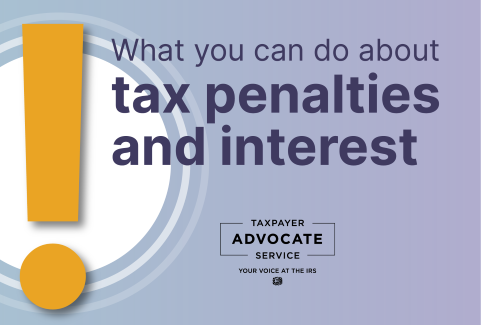

There are many reasons why the IRS may charge penalties on your tax account. The IRS is legally required, under IRC § 6601(a), to charge interest when you fail to pay the full amount you owe on time. Interest may also accrue on penalties. Interest, and any applicable penalties, will continue to accrue until you pay your balance due in full. Here are some of the most common penalties, information on why they may have been charged, and how to request penalty abatement (removal) if applicable.
First let’s talk about some common penalty charges on individual accounts, along with interest, and why the IRS charges them.
Common penalties include:
The IRS is required to charge interest on any unpaid balance owed until it is paid in full. Learn more on the IRS’s Interest page, or view the latest interest rates.
The IRS may be able to remove or reduce some penalties due to reasonable cause, but only if you tried to comply with the tax law but were unable to due to facts and circumstances beyond your control. If this applies to you and you have the necessary documentation to support your claim, you can call the toll-free number on your IRS notice or write a letter to request penalty relief due to reasonable cause.
The IRS may also provide administrative relief from a penalty that would otherwise be applicable under its First Time Penalty Abatement policy. In this instance, the IRS may provide relief if:
The IRS may also be able to waive penalties if a Statutory Exception exists. Tax legislation may provide an exception to a penalty. Specific statutory exceptions can be found in the penalty-related Internal Revenue Code (IRC) sections. These would include situations like receiving erroneous written advice from the IRS.
If you received a notice or letter stating the IRS didn’t grant your request for penalty relief, you may be able to request a hearing with the IRS Independent Office of Appeals. Use the Penalty Appeal Online Self-help Tool for more information. You have 30 days from the date of the rejection letter to file your request for an appeal. Refer to your rejection letter for the specific deadline.
If any of your tax and/or penalties are reduced, the IRS will also automatically reduce the related interest. Interest is charged by law and will accrue until your tax account is fully paid. Interest can only be reduced or removed under certain circumstances due to unreasonable IRS error or IRS delay, not because of reasonable cause nor because it’s the first time you have accrued interest on your account.
To dispute interest due to an unreasonable IRS error or IRS delay, submit Form 843, Claim for Refund and Request for Abatement or send the IRS a signed letter requesting that the IRS reduce or adjust the overcharged interest. For more information, see Instructions for Form 843.
The IRS will continue to charge the failure-to-pay penalty up to 25% of the unpaid taxes or until the tax is paid in full, whichever comes first. In general, the IRS won’t abate the failure-to-pay penalty until the underlying tax has been paid in full. Be aware that if there is still a balance due, even after the penalty is removed, interest will continue to accrue until the account is paid in full, so the sooner you pay the balance, the less you will have to pay in penalties and interest.
There are several ways you can send a payment, including payment options if you cannot full pay right now. See the IRS Pay webpage or our Paying Taxes Get Help pages and TAS Tax Tip: Need help resolving a tax amount owed or finding the right payment option?
For more updates from the Taxpayer Advocate Service, visit the news and information center to read the latest tax tips, blogs and more.